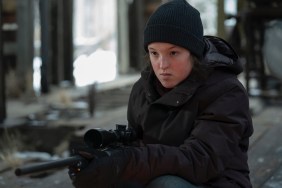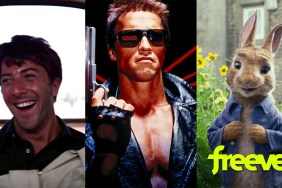One of the more intriguing films debuting at this year’s Toronto International Film Festival is Stephen Poliakoff’s Glorious 39, the playwright and television director’s first feature film in over ten years.
It stars Romola Garai as Anne Keyes, an actress living in 1939 England as the country is on the cusp of going to war with Germany, who starts suspecting her adopted family of being involved in a government conspiracy when people around them, both family acquaintances and Anne’s friends, start turning up dead. Her adopted father, played by Bill Nighy, a retired government figure, her brother Ralph (Eddie Redmayne) and sister Celia (Juno Temple) thinks she’s being overly dramatic–she is an actress after all–but as war seems imminent, the entire country seems to be going mad, and Anne seems to be caught in the middle of it.
The movie harks back to the earlier films of Hitchcock and Michael Apted’s Enigma in terms of combining political intrigue and more surreal thrills, but it’s quite impressive for the amazing cast Poliakoff was able to assemble, including rare screen appearances by legends Julie Christie and Christopher Lee.
Glorious 39 premiered at the Toronto Film Festival at the historic Elgin Theater to a packed audience last week, and the next day, ComingSoon.net sat down with Poliakoff, Garai and Bill Nighy to talk about some of the ideas and themes explored in the film.
ComingSoon.net: I saw the movie last night and there’s a lot to absorb, including many things that as an American, I didn’t really know about England at the start of WWII. This also seems like the type of thing that can be written as a novel or play and then adapted for the screen, so can you talk why you decided to do a movie about this period and subject that hasn’t really been explored?
Stephen Poliakoff: Well, I have always been very interested in whether it was completely unavoidable to face up to Hitler in 1938 when Munich happened and when basically we, the Brits, let him rearm and then said, “Oh gosh, you’re too powerful.” So then there were two options really, to go to war or do a deal with him, and it was such a close run thing that we didn’t do a deal with him. I got more and more interested in telling that story in a way that would have a resonance for modern audiences. I love thrillers, but in the Hitchcockian tradition of being character-based and things emerging and not just shocks for shock’s sake. To bring together a period that really fascinated me and I thought really mattered–because I wouldn’t be here if things had gone the other way and a lot of people wouldn’t be here. Also, it’s a story that hasn’t been told then set that round a family and have it be accessible for a modern audience, because it’s through the eyes of the young woman, the father-daughter relationship. All those elements came together and that’s why I made it.
CS: I’m interested in the cast’s connections to this time. Bill, you probably have parents that went through this, but Romola, when you read the script or learned about it, what kind of resonance did you have with it? Was this an interesting subject for you?
Romola Garai: Yeah, I mean, for me very much so. My father’s family are Hungarian Jews who emigrated first to New York and then to the U.K. So similarly to see them is obviously a very personal investment in the fact that Britain has taken on the mantle of the great protector, especially with regard to the Holocaust. Obviously it wasn’t ever as simple as that, specifically to do with the policy of appeasement. I was thinking what was really apparent in the script to me in terms of what Stephen is saying is being a thriller, but a psychological thriller, not something that’s just a plot, you know, it’s very much based in psychological fear like all of Hitchcock’s great films. The fundamental fear of Anne is that your family doesn’t really love you. That’s the kind of great Freudian fear at the center of it and that was something I think children who are adopted specifically fear. I don’t think that that’s such a psychological, a deep-rooted psychological fear that people have rarely addressed in film before.
CS: How about yourself, Bill? As you were growing up did you hear stories of this period?
Bill Nighy: Yeah, I think people of my generation who just missed the War have probably an ill-advised nostalgia for the period. People that had to live through it, of course, it’s a different matter. I am fascinated by the period more than any other really. It’s extraordinary. When you’re at school in England, if you’re my age, what you were taught was that our Prime Minister, our leader, went to Germany and was duped by Adolph Hitler of the Nazi Party and came home and humiliated himself by waving a white piece of paper at an airport that said, “Peace in our time.” But I didn’t know anything further than that. Since, Stephen gave me books which I’ve read about the subject and it is the most extraordinary period of British history. The fact that it’s hard to think now that Hitler was Man of the Year in 1937 and on the cover of “Time Magazine.” “The Daily Mail” in England at one point hailed him as the leader that we have long awaited. The editor of “The Times” said, “I lie awake at night trying to think of new ways of pleasing the Nazi Party.” I mean, that a paraphrase, but it’s how not to upset they thought they were going to be united largely by mostly the stuff that Stephen was talking all about in the books that he had, that they viewed the German Air Force then as we might now view nuclear power. They thought the choice was annihilation or not when Neville came home and the Prime Minister came home with that piece of paper, grown men wept in the street because they thought their children weren’t going to die. So it’s rich pickings for a big, entertaining thriller. The responsibility here is first, in all of Stephen’s work if you don’t mind me saying when he’s sitting next to me, is apart from whatever else it does, it is entertaining and it’s arresting. Stephen has a unique talent of finding angles and visual metaphors I hate using that word, but visual…
Garai: Motifs?
Nighy: “Motifs” will do which illuminate the subject. But, they are also just a knockout to watch. So it’s an edge of your seat affair, that’s how it should operate.
CS: You mentioned the adoption thing, and it is a very interesting perspective to have a character who is adopted but also an actress, which is not something a lot of people can relate to. Can you talk about how you decided on having Ann be the central viewpoint of the story?
Poliakoff: Yes, although I think a lot of people can relate to, “Am I the favorite in the family?” I think that that is an incredibly universal thing and not being the first blood born. She’s the first child and then as often happens with people who adopt then suddenly (have children), they can see a lot of that. So I think that is quite a universal thing. As for the actress well, it was important that she is undermined in the story by events. Actors were not very high up on the social scale in the 1930’s. People were very patronizing about them, especially the ruling elite and the aristocracy. Julie Christie’s character would not really approve of her niece being an actress. It was like being in trade. It was common and women were meant–especially in affluent families–to find an affluent husband with an affluent house and marry him. That was true right up to Princess Diana that was going on and that’s what she was meant to do. So that is why. I wanted also for her to have a profession and to have her own life and to be a bit Bohemian and a bit independent, but also tied to her family. So, if she’d been a bit more working in commerce, that wouldn’t have been appropriate, or in the advertising industry which was just starting, she thinks would not be appropriate. Being an actress is also quite a tenuous, it’s quite a vulnerable profession. So it was a sort of perfect occupation for her to have for her to be taken not too seriously when things go wrong. Also, it allowed her to have a romantic and sexual life which was not normal that people had… I mean, they weren’t virgins, but they normally got married first, so she was able to have a more independent life because that’s possible. All those things came together very smoothly.
CS: How about playing an actress from the ’30’s? Did you do some research in the differences in behavior or was that all in the script?
Garai: Yeah, obviously the films of Hitchcock were very important as a kind of reference point in terms of the material. They were also important to me because that were the kind of films that Anne had placed more cards in. So, it was useful, you know, not only to getting a sense of the kind of film that Stephen was making, but also in terms of character research.

Poliakoff: Especially the British Hitchcock.
Garai: Yes, the early Hitchcock.
Poliakoff: That might’ve been a minor part in one of those.
Garai: Also, there was a really good book called “The Last Season” which was about the debutante season in 1939 which really exemplified the kind of massive denial of the aristocracy, but also most of Britain were in, leading up to the Second World War and that kind of last hoorah. Really, really, that was kind of the fall of Versailles before the French Revolution. It was the last moment of the aristocracy as we understand it in England really existing. It was important, I think it was interesting for me that Stephen had written her as an actress ’cause although you say it’s harder for people to relate to somebody in what is essentially quite an unusual job, largely the film is about the assumption of masks and about the fear that people around you are not really as they seem to be, you know, they don’t really love you, they don’t really accept you, that everyone is playing a part in the film. For me it was significant that that was the job that she did because whereas she’s the actress it is in fact the ones around her that is pretending.
CS: Bill, how did you see your character, Sir Alexander? Before the screening last night, Stephen said that this was a very different Bill Nighy and it was. How did you approach this man who seems very serious and strict at times, but also whom we see playing with kids later on?
Nighy: I think he’s a pretty decent man. He’s a sincere man. I made the mistake, as I have made before, that in so much as I thought I was involved in some kind of lie, in fact, he’s not in a lie. I mean, he withholds information, but he fought in the First World War. The First World War was inexpressibly horrendous. It was 18 years prior to the action in the movie. Everyone else thought that it was impossible for Britain to win a war against Germany, so the responsible thing to do is prevent one. The length to which he and his colleagues had to go, that’s extreme obviously. But I think he’s a very interesting character and I think these are matters which you don’t see it’s again one of the things that Stephen offers is that you see in him things that you don’t see in others. This is a character that you won’t find anywhere else as with most of the whole of the movie. It’s a very original idea, and it’s also a very unique way of looking at the period, but I think (Alexander) is trying to do the very best thing. He’s sincere, he loves his country. He thinks he’s the best thing for his country and he loves his family including his adopted daughter and he thinks it’s the best thing for them. He thinks it’s life or death for them, so he chooses life.
CS: Can you talk about one of the themes of the movie, which is the government using fear to prevent war? That’s almost the complete opposite of what happened five or six years ago. It’s an interesting contrast, and it’s almost hard to avoid.
Poliakoff: Interestingly, both Bush and Tony Blair referred a lot to the comparison to the 1930’s, because of Hitler and said, “We mustn’t make the mistake that they did.” That, to me, was a completely false analogy because (chuckles) Saddam wasn’t such a threat as Hitler. I was astonished that nobody ever did, in Britain anyway, a program or even a documentary about appeasements as Blair was constantly referring to it. It is a big fear, you’re quite right. Fear was used. Fear was used to justify appeasement. We have to excuse a lot of it because of the terrible tragedy of the First World War, but ultimately, it was something very wicked because it wasn’t true. Hitler wasn’t as strong as they made out. The previous British Prime Minister to Neville Chamberlain’s cabinet board said, “Bombers will always get through.” People were terrified. That’s why they pulled all that text out because they thought they’d be bombed sh*tless. They couldn’t get it they were flying from Germany, miles away from Britain. Until they got to France which is where they started bombing the sh*t out of them. They only would’ve been able to be over Britain for about a minute at the most. There was no way. Also, there was a wonderful story about Lindbergh, the great aviator hero of the 1930’s, who was not quite a Fascist, but a bit of a Fascist sympathizer. He certainly thought the Nazis were great, because he was such a great superstar of the world, he was shown the German Air Force. They put him up in a nice hotel and they took him up to the local Aerodrome and showed him some planes. Then they wined and dined him that night and drove him a car.
Meanwhile, they flew the same planes onto another airport, rearranged them a bit and he thought they were different planes. This is the absolute truth, he said, “By God, they’re so powerful.” In fact, they kept on fooling him by moving their planes around, something that is almost out of like, a Peter Sellers movie. But actually, that’s what the Nazis were doing. He came back and told everybody in Britain. He told Joseph Kennedy, John Kennedy’s dad who was the American Ambassador in Britain at the time and was a great believer that Britain would be slaughtered by the Germans and they would be afraid of the Americans to get involved. He told him all this and he told Roosevelt. It was him saying that they’re incredibly more powerful than the Brits. There was a bit of duping going on by the Nazis, but also they exaggerated the threat, the British elite of the time said that they could stay out of the War and that their lifestyle could continue because they were far more worried about Communism than they were about Fascism. The British aristocracy and the British political elite were entwined. They entertained the politicians every weekend in their big outhouses, the aristocracy and the newspaper editors at the time and it was in all of their interests to view Hitler through that prism, either it was actually not a bad thing at all is far too dangerous for us to take up, those were the twin arguments. Ultimately, the consensus of the stories now changes every five years as we sit here, but the consensus at this moment whether they’re American historians, Canadian historians, British historians that write about this period or whoever else is that a few years ago it was actually Chamberlain that was quite a good idea because the world didn’t stood up to Hitler in 1938 because Britain would’ve lost. Now the consensus says if only France and Britain had stood up to Hitler in 1938 he would’ve been toppled because there was a military cue planned, ’cause they didn’t want to go to war, were going to move against him and he would’ve been toppled and 15 million people’s lives would’ve been saved. So it is one of the most extraordinary if only’s, the biggest if only of history, of recent history. So yeah, you’re quite right, it was used. Fear was used in the film as well.
CS: I want to talk more about what it was like on set with this amazing cast. Bill, you and Julie are sort of like the older generation among a lot of these young talented actors who have been doing stuff. Can you talk first about being on this kind of set where it has a lot of younger people of your generation?
Garai: Well, I think it’s always a mixed blessing getting to work in Stephen’s films because you get to work with obviously one of the great auteurs of British film, but you also know you’re going to be up against (Laughs) a really terrifyingly brilliant cast of people. Obviously, I’d had the opportunity to work with Bill before and so that was great in that we had a working relationship already, but I’d never even met Julie Christie and it would be a frightening thing to meet Julie Christie let alone have to kind of sit and have pleasant conversations and try to have conversations with her about characterization. I was also really, really excited to work with Juno Temple and Eddie Redmayne, who I think are two of the most talented actors working in Britain at the moment. I think it’s a really truly difficult task as an actor to play parts which exemplify the subtly of a point in history like this. People were doing bad things for good reasons and yet we have the whole debate around the Second World is like a political debate. It’s now completely polarized. It’s good, there’s good, there’s evil. People stand in this camp, Britain is good because it went into the War and actually those characters really demonstrate the true subtlety of this period and I thought that was a testament to their amazing ability that they were able to give such incredibly subtle performances.
CS: Bill, what was the experience like for you to just be amongst all these great actors in a big house together? Did you see this as just another movie?
Nighy: No, it was special. I saw it up ahead and it was my reward for doing other things frankly. (Laughs) I am proud and pleased to say that Romola and Juno have employed me as their father. Juno, I was her father in “Notes on a Scandal” and Romola and “I Capture the Castle,” both of which… (to Romola) was that your first job?
Garai: It was, but it was my first kind of proper job.
Nighy: It was also Juno’s in “Notes on a Scandal.” So I am the first of their careers, a little film trivia fact for anyone out there. But no, it was great. It was a very cool set. Stephen keeps a cool atmosphere. It was very professional. Sort of a testament to his script and general reputation that he can attract a cast like that. It was extremely satisfying being married to Jenny Agutter. In fact, I said that to her and she said, “I bet you say that to all the girls.” It wasn’t true. I have never said that. I’ve never said, “It’s very nice being married to…”

CS: You never told that to Cate?
Nighy: Cate Blanchett? It was extremely nice being married to Cate Blanchett. (I don’t believe I was married to her.) But no, it was lovely. I don’t think I ever said it to her, but it was very nice.
CS: You have these young actresses seeing you as a father figure, so do you at feel like a mentor to them or do you prefer to give them their space?
Nighy: No, they’d just laugh. No, they don’t need any help. They’re doing fine.
CS: What would you like people to get out of this movie? We’ve talked about some of the themes and some of the comparisons to today. Obviously, younger people will see it as a thriller, but it’s also very surreal at times, and it gets into almost “Children of the Corn” territory with people acting strange and not knowing what’s going on.
Poliakoff: “Children of the” what?
CS: “Children of the Corn.” Do you know that one? Stephen King story about kids who rebel against the parents and they’re acting strangely and you don’t know why.
Poliakoff: No. Well, you mean the boy? Yeah, it was an extraordinary time. There is no way of dramatizing that time correctly without being as bold as that because reality would’ve been incredibly more surreal than I show you just driving through a city because three weeks before war was declared you could’ve driven through London and you would’ve seen people driving up in their limos at the times, some of the greatest parties of the 20th century held in Central London. Three weeks later, London was covered in sandbags and the people put all their pets down, so if you’d driven along each high street, each vet would’ve had a pile of dead bodies of animals on the pavement next to the letterbox with people clip-clopping past a pile of dead cats and dogs. That is about as surreal a sight, and that’s what happened. That is true, so I had to dramatize that.
CS: I’ve never seen that in a movie.
Poliakoff: No, I know. It’s never been shown in a movie. (chuckles) This was the first. But yes, that’s the point of doing it; you haven’t seen it. (laughs)
Nighy: Generally, movies that circle around this period, they leave that bit out.
Poliakoff: Yeah, yeah. Eddie Redmayne’s speech about seeing a huge solar beast, that’s from a diary at the time, somebody bicycling along and going, “God, what’s this monster moving in the park?” And it was barrage balloons being inflated, and it was slithering along the ground. So you will have seen these extraordinary sights with three weeks before people flowing along in their beautiful dresses to go to these balls. That is as surreal a time as there probably there was in the whole 20th century besides the First World War.
CS: What’s been the reaction when you talked to people last night about the bonfire of the pets, for lack of a better term?
Poliakoff: That’s a good title.
CS: “Bonfire of the Pets”? Yeah, that would sell it. What’s been people’s reaction to that when you talked to them after they saw the movie?
Poliakoff: I didn’t actually talk to anybody about the bonfire. (Laughs)
CS: It’s very shocking I’m sure.
Poliakoff: No, it is shocking, but that’s what happened. Also, obviously it’s a perfect metaphor of what might have happened to people as it happened in Europe if we’d done (a deal with Hitler). France did a deal with Hitler – they were invaded and they did a deal and then they stopped fighting and some of my own family ended up in the ovens. So that’s what would’ve happened to my family in Britain. Immediately, I read that and I was amazed. There was a very good quote from The New York Times correspondent in London at the time when he wrote to his wife, “You can’t imagine what it’s like being in a city without children and without pets until they’re gone. You don’t realize what a difference it makes.” I thought that was amazing. It was the history of science fiction almost, because that’s like a science fiction. But that was written at the time that it happened and it hit him so much, the silence without hearing children playing in the park and without dogs going, “Yup, yup, yup.” That was one of my central images for the film and it was right from the observation of a journalist right on the ground at the time.
Garai: I love the story that you tell Stephen, when Stephen was location scouting for the vet he went to Morvern, which is a suburb of London, and there was this building with this clock tower. It was just the most kind of hideous, I mean, the Auschwitz kind of image to me. It was just standing there. I just found that completely haunting.
CS: That vet location in the film is surprisingly eerie even though you’re never sure what’s going to happen to her there. It’s really effective.
Poliakoff: You asked me what effect I wanted to have on an audience and I didn’t actually answer. I never got to the punch line. It’s the sort of effect that happened last night which is having people hopefully gripped by the film at the end, but then you’re very thoughtful–in a good way hopefully–about what might have happened if it had gone the other way. A lot of people say to me, “Oh, I want to see it again.” I thought, “That’s great,” ’cause one of my favorite movies is “Rosemary’s Baby,” which is a movie you could see again and again and again. I used that slightly as a template because it features a young woman in the center, people very close to her, she is uncertain about whether they’re going to and an older friend like the older actors. Yeah, so that was great to hear that; that’s exactly the reaction I wanted. (Laughs)
Glorious 39 recently premiered at the Toronto International Film Festival, and it’s currently looking for distribution.









